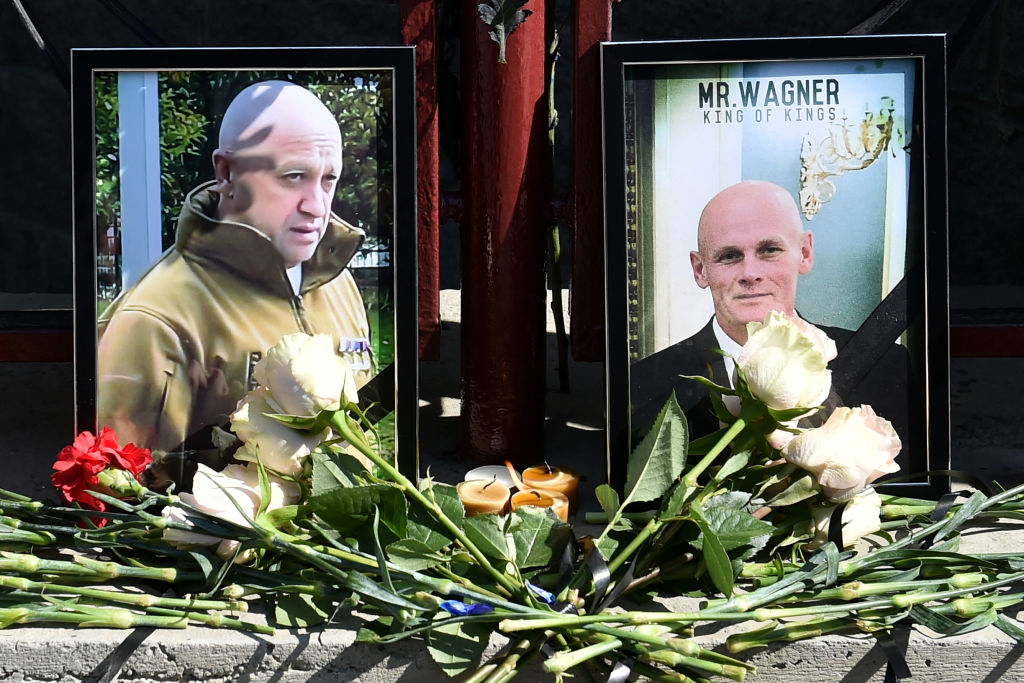After Yevgeny Prigozhin’s aborted march on Moscow at the end of June, the Wagner Group leader became a divisive figure in Russia. He was not quite a pariah – on account of his mercenary group’s huge contribution to the war in Ukraine and Putin’s seemingly weak decision to condemn him to barely enforced exile in Belarus – but definitely not a hero either.
Therefore it comes as no surprise that, following his sudden demise in a plane crash en route to St Petersburg yesterday, the Russian press has struggled with how to cover the news.
Notably, despite Prigozhin’s status for nearly a year as an invaluable contributor to the ‘special military operation’, none of the papers have run obituaries or glowing, weepy tribute pieces to a ‘war hero’. Instead the tone of the coverage in Russia has ranged from morbid curiosity to clinical factual reporting.
The most surprising coverage of Prigozhin’s crash has come from the usually straight-laced business broadsheet Kommersant. In a long article scathingly titled ‘Wagner has suffered a non-military defeat’, the paper runs through the facts of the incident before, interestingly, examining several theories as to what may have happened. Experts the paper spoke to say that it is unlikely that an engineering fault or human error is to blame for the crash, ‘but most likely the sabotaging of the aircraft or an explosion on board led to the disaster’. It also gives credece to the theory that Prigozhin’s plane was taken out by air defence systems.
Kommersant appears to be the only paper indulging in this sort of speculation. None of these theories have been independently investigated or verified yet, and we are unlikely to find out the truth of what happened for some time – particularly if the jet was downed on Putin’s orders. This makes Kommersant’s coverage all the more interesting.
Some of Russia’s military bloggers have been more comfortable addressing the speculation around Prigozhin’s death, even if they are dismissive of Putin’s involvement. On his Telegram channel ‘Logika Markova’, former Putin advisor Sergei Markov has slammed western coverage of the incident, ridiculing suspicion that Prigozhin’s jet was downed on Putin’s orders. He says this explanation isn’t credible as Prigozhin was someone ‘who now posed no political threat’ to Putin.
Similarly, the milblogger Rybar has given a quick summary of the circumstances of the plane crash, referencing suggestions the plane was delayed at take off due to technical difficulties. He also touched on the reaction of Wagner Group, branding the suggestion that some have been calling for a fresh march on Moscow ‘Ukrainian propaganda’ that he says is easy to spot a mile off.
The tabloid Komsomolskaya Pravda has, meanwhile, chosen to lead its coverage with grim photos and footage showing the smoking wreckage of Prigozhin’s plane. The paper rounds up the main facts of the incident, confirming that Russia’s investigative committee has opened up a criminal investigation into the crash on the grounds of ‘violation of the rules for traffic safety and operation of air transport’.
Russian newspapers seem careful not to place the spotlight too firmly on Prigozhin’s death alone, highlighting that he was just one of ten people killed. The broadsheet Izvestia has given a detailed summary of yesterday’s events in an article titled ‘Overboard: ten people have died in an air catastrophe in Tver’ – based on the headline alone, the reader would have no idea this referred to Prigozhin’s death. The paper has accounts of the crash from eyewitness, including one who claims to have seen the plane hurtling to the ground with just one wing.
The most clinical coverage of Yevgeny Prigozhin’s death comes from the two news agencies most closely associated with the Kremlin, TASS and Ria Novosti. Both have been publishing short updates on their news wires as and when information emerges. One of the most recent stories covered by TASS is the news that the jet’s altitude fluctuated dramatically in the last 30 seconds before it crashed. Ria Novosti reports on the fact that another fragment of the plane was found near the crash site this morning.
Both news agencies have, however, devoted most of their coverage not to Prigozhin’s plane crash but the Brics summit taking place in South Africa. Despite Putin refusing to attend over fears he could be arrested, the summit has been strategically important for him for maintaining his image as a global leader of influence. As such, both TASS and Ria Novosti have portrayed it as a PR coup for the president. As for Prigozhin, Putin has yet to comment publicly on his death.
We may learn more about the Kremlin’s attitude to Prigozhin’s death from the media coverage of the criminal investigation into the crash and Prigozhin’s funeral. Will the Wagner chief receive a funeral with honours, or will it be a hasty burial done on the quiet? And what will the Russian authorities blame for the crash?
One thing is certain though: Prigozhin may have died, but he won’t be disappearing from the headlines anytime soon.







Comments